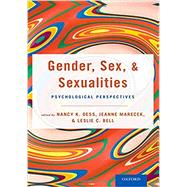Gender, Sex, and Sexualities Psychological Perspectives
, by Dess, Nancy; Marecek, Jeanne; Bell, Leslie- ISBN: 9780190658540 | 0190658541
- Cover: Hardcover
- Copyright: 2/15/2018
For decades, the field of gender, sex, and sexualities has been a focal point of increasing interest. This inquiry has been ignited by successive waves of dramatic social change, chief among them: the re-emergence of feminist movements in the U.S. and Europe in the late 1960s; the sustained (and increasingly successful) bids for legal, social, and religious acceptance of non-heterosexual sexualities in many parts of the world; and the burgeoning number of people (whether cisgendered, gender-variant, trans, or questioning) whose individual and collective experiences of gender and sexuality warrant deeper understanding and further progress toward a fuller realization of human potential and civil rights.
In psychology, the intellectual project of understanding gender, sex, and sexualities encompasses a variety of subfields spanning neuroscience and developmental, cognitive, social, and cultural psychology, as well as critical theory. As such, these approaches have inspired new and different psychological questions, as well as increased interest in previously unfamiliar topics of investigation.
Edited by Nancy K. Dess, Jeanne Marecek, and Leslie C. Bell, Gender, Sex, and Sexualities offers both students and scholars the tools they need to consider and approach such questions as: how do children come to embrace (or repudiate) gendered activities and identities; how do people experience intimacy, desire, and sexual arousal; and what strategies can psychologists use to de-center their own points of view and effectively contribute to a decolonial psychology?
As a result, this volume will open new avenues of inquiry as well as cross-disciplinary conversations for readers everywhere.
In psychology, the intellectual project of understanding gender, sex, and sexualities encompasses a variety of subfields spanning neuroscience and developmental, cognitive, social, and cultural psychology, as well as critical theory. As such, these approaches have inspired new and different psychological questions, as well as increased interest in previously unfamiliar topics of investigation.
Edited by Nancy K. Dess, Jeanne Marecek, and Leslie C. Bell, Gender, Sex, and Sexualities offers both students and scholars the tools they need to consider and approach such questions as: how do children come to embrace (or repudiate) gendered activities and identities; how do people experience intimacy, desire, and sexual arousal; and what strategies can psychologists use to de-center their own points of view and effectively contribute to a decolonial psychology?
As a result, this volume will open new avenues of inquiry as well as cross-disciplinary conversations for readers everywhere.







